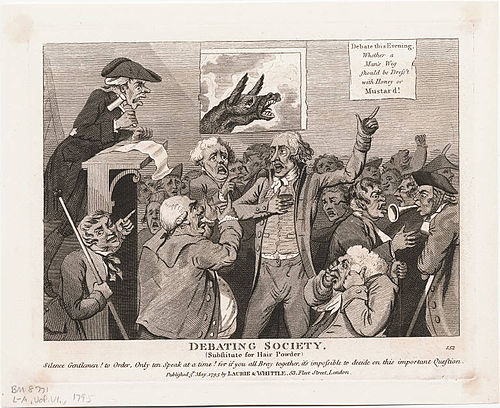Argumentnoun
A fact or statement used to support a proposition; a reason .
Argumentnoun
A verbal dispute; a quarrel.
Argumentnoun
A process of reasoning.
Argumentnoun
A series of propositions organized so that the final proposition is a conclusion which is intended to follow logically from the preceding propositions, which function as premises.
Argumentnoun
(mathematics) The independent variable of a function.
Argumentnoun
(mathematics) The phase of a complex number.
Argumentnoun
(programming) A value , or reference to a value, passed to a function.
Argumentnoun
(programming) A parameter in a function definition; an actual parameter, as opposed to a formal parameter.
Argumentnoun
(linguistics) Any of the phrases that bears a syntactic connection to the verb of a clause.
Argumentnoun
(astronomy) The quantity on which another quantity in a table depends.
Argumentnoun
The subject matter of a discourse, writing, or artistic representation; theme or topic; also, an abstract or summary, as of the contents of a book, chapter, poem.
Argumentnoun
Matter for question; business in hand.
Argumentverb
To put forward as an argument; to argue.
Argumentnoun
Proof; evidence.
Argumentnoun
A reason or reasons offered in proof, to induce belief, or convince the mind; reasoning expressed in words; as, an argument about, concerning, or regarding a proposition, for or in favor of it, or against it.
Argumentnoun
A process of reasoning, or a controversy made up of rational proofs; argumentation; discussion; disputation.
Argumentnoun
The subject matter of a discourse, writing, or artistic representation; theme or topic; also, an abstract or summary, as of the contents of a book, chapter, poem.
Argumentnoun
Matter for question; business in hand.
Argumentnoun
The quantity on which another quantity in a table depends; as, the altitude is the argument of the refraction.
Argumentnoun
The independent variable upon whose value that of a function depends.
Argumentverb
To make an argument; to argue.
Argumentnoun
a fact or assertion offered as evidence that something is true;
Argumentnoun
a contentious speech act; a dispute where there is strong disagreement;
Argumentnoun
a discussion in which reasons are advanced for and against some proposition or proposal;
Argumentnoun
a summary of the subject or plot of a literary work or play or movie;
Argumentnoun
a variable in a logical or mathematical expression whose value determines the dependent variable; if f(x)=y, x is the independent variable
Argumentnoun
an exchange of diverging or opposite views, typically a heated or angry one
Argumentnoun
a reason or set of reasons given in support of an idea, action or theory
Argumentnoun
an independent variable associated with a function or proposition and determining its value. For example, in the expression y = F(x₁, x₂), the arguments of the function F are x₁ and x₂, and the value is y.
Argumentnoun
another term for amplitude (sense 4)
Argumentnoun
any of the noun phrases in a clause that are related directly to the verb, typically the subject, direct object, and indirect object.
Argumentnoun
a summary of the subject matter of a book.
Argument
In logic and philosophy, an argument is a series of statements (in a natural language), called the premises or premisses (both spellings are acceptable), intended to determine the degree of truth of another statement, the conclusion. The logical form of an argument in a natural language can be represented in a symbolic formal language, and independently of natural language formally defined can be made in math and computer science.
Debatenoun
An argument, or discussion, usually in an ordered or formal setting, often with more than two people, generally ending with a vote or other decision.
Debatenoun
An informal and spirited but generally civil discussion of opposing views.
Debatenoun
(uncountable) Discussion of opposing views.
Debatenoun
(frequently in the French form débat) A type of literary composition, taking the form of a discussion or disputation, commonly found in the vernacular medieval poetry of many European countries, as well as in medieval Latin.
Debatenoun
(obsolete) Strife, discord.
Debateverb
(ambitransitive) To participate in a debate; to dispute, argue, especially in a public arena.
Debateverb
To fight.
Debateverb
To engage in combat for; to strive for.
Debateverb
(transitive) To consider (to oneself), to think over, to attempt to decide
Debateverb
To engage in combat for; to strive for.
Debateverb
To contend for in words or arguments; to strive to maintain by reasoning; to dispute; to contest; to discuss; to argue for and against.
Debateverb
To engage in strife or combat; to fight.
Debateverb
To contend in words; to dispute; hence, to deliberate; to consider; to discuss or examine different arguments in the mind; - often followed by on or upon.
Debatenoun
A fight or fighting; contest; strife.
Debatenoun
Contention in words or arguments; discussion for the purpose of elucidating truth or influencing action; strife in argument; controversy; as, the debates in Parliament or in Congress.
Debatenoun
Subject of discussion.
Debatenoun
a discussion in which reasons are advanced for and against some proposition or proposal;
Debatenoun
the formal presentation of and opposition to a stated proposition (usually followed by a vote)
Debateverb
argue with one another;
Debateverb
think about carefully; weigh;
Debateverb
discuss the pros and cons of an issue
Debateverb
have an argument about something
Debatenoun
a formal discussion on a particular matter in a public meeting or legislative assembly, in which opposing arguments are put forward and which usually ends with a vote
Debatenoun
an argument about a particular subject, especially one in which many people are involved
Debateverb
argue about (a subject), especially in a formal manner
Debateverb
consider a possible course of action in one's mind before reaching a decision
Debate
Debate is a process that involves formal discourse on a particular topic. In a debate, arguments are put forward for often opposing viewpoints.









